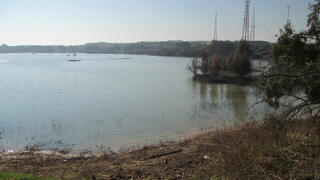An investigation by Israeli watch group Shomrim , in collaboration with Ynet, has revealed serious contamination risks to the Shikma reservoir — one of Israel’s key groundwater reserves. The crisis began months ago with the collapse of the Sderot-Sha’ar HaNegev sewage treatment plant (STP), which led to cholera bacteria being detected in wastewater flowing into a nearby stream, threatening the reservoir. Pollution at the Shikma reservoir ( Video: Society for the Protection of Nature in Israel ) The STP’s director later admitted that abnormal industrial waste from local factories was preventing the plant from resuming normal operations, even though the repair deadline had long passed.
“Every day that passes, we’re polluting the stream, unfortunately,” he said. But recent findings show the situation is even worse. Water Authority tests conducted last month at a new monitoring well near the Shikma reservoir, close to Ashkelon, revealed the presence of fuel and other potentially toxic or carcinogenic chemicals in the groundwater.

Experts suspect the contamination stems from illegal waste dumping and damage to fuel pipelines. The contamination was detected at a new well, “Ashkelon South 6,” which was drilled to monitor the southern Ashkelon industrial zone located next to the reservoir and to Mekorot’s water wells. Samples showed traces of ethylbenzene, xylene and chlorinated organic compounds.
As this was a new monitoring point, the Water Authority plans to repeat the tests. A Health Ministry official said that the findings call for continuous monitoring by all relevant authorities. “This water will not be used for drinking under any circumstances,” he stressed, noting that one well (Well 3) had already been shut down and others could be closed if needed.
Strategic reservoir under threat The Shikma site functions as a natural infiltration system, collecting floodwater and desalination overflow and directing it into the coastal reservoir through sand-layered infiltration pools. Dozens of Mekorot wells surround the site and supply high-quality drinking water to Ashkelon and the national water system. In rainy years, the open land south of the industrial zone collects between 3 and 6 million cubic meters (793 million to 1.
6 billion gallons) of water. Now, the contamination threatens those wells. Experts warn that if the pollution isn’t removed, it could spread throughout the reservoir and affect additional wells.
A letter sent last week by Amir Yitzhaki, head of the Health Ministry’s environmental health division, warned of “severe harm” to the Shikma site. “Unfortunately, we see no long-term viability for operating the Shikma site as a drinking water source,” he wrote. Criminal activity, weak enforcement Environmental and health experts have long warned of threats to the Shikma reservoir due to lax enforcement against illegal activity in the area, including sand theft and waste dumping.
Another key concern is the expansion of the industrial zone near the reservoir, which adds pressure on local infrastructure. Get the Ynetnews app on your smartphone: Google Play : https://bit.ly/4eJ37pE | Apple App Store : https://bit.
ly/3ZL7iNv The area already hosts multiple facilities that handle and store fuels, including those operated by EAPC, Petroleum & Energy Infrastructures Ltd. and the Israel Electric Corporation. Officials from the Water Authority and Health Ministry say contractors working at the site to prepare land for new factories buried illegal waste and covered it to hide the evidence.
They believe this waste is behind part of the contamination. 4 View gallery Well 3 site Additional pollution is suspected to have come from damaged fuel pipelines, likely caused by sand thieves operating unchecked near the site. In recent years, significant amounts of sand have been stolen from the site’s perimeter, potentially harming the natural filtration process.
Additionally, the state has approved land sales for 13 new factories in the southern Ashkelon industrial zone — right next to the reservoir and its wells. Health Ministry officials warn this will further strain sewage infrastructure and raise the risk of hazardous leaks into the groundwater. Farmers paying the price In addition to pollution and illegal activity, untreated and poorly treated wastewater continues to flow from the Sderot-Sha’ar HaNegev STP through the Shikma stream and into the reservoir — an issue previously reported by Shomrim.
The Health Ministry confirmed that contaminated water recently reached the Shikma site, prompting a ban on diverting it to infiltration pools. The plant’s ongoing failure is also hurting farmers from nearby kibbutzim. Before the STP collapsed, they received 4 million cubic meters (over 1 billion gallons) of treated water annually at cost (just covering energy expenses).
Now, they must purchase expensive alternative water from another water plant at rates ranging from 1.44 shekels to 5 shekels per cubic meter (approx. $0.
38 to $1.32 per 264 gallons). 4 View gallery ( Photo: Haim Rivlin, Shomrim ) “Our members are spending to keep the association running but it can’t go on, especially with irrigation season starting,” said Meir Brokenthal, the association’s CEO.
He added that the Water Authority has failed to honor its promise to compensate the farmers for the extra costs caused by the STP failure. “The Water Authority tells us to speak with the STP. The STP says it has no money.
We stepped in out of national responsibility — and now it feels like we’ve been used and tossed aside.” In response, the Water Authority confirmed that the association had recently filed a compensation request with the Sderot-Sha’ar HaNegev Sewerage Union. Authorities promise monitoring but downplay long-term risk In a statement, the Water Authority stressed the strategic importance of the Shikma site, which absorbs floodwaters and excess desalinated water during winter, supplying multiple Mekorot wells with high-quality water.
They said a long-standing monitoring program is in place, regularly testing floodwater and groundwater quality. “Findings from the monitoring program do not indicate significant deviations in water quality,” the statement read. 4 View gallery ( Photo: Haim Rivlin, Shomrim ) They acknowledged ongoing pollution risks but claimed that government agencies have sufficient regulatory tools to prevent contamination.
The authority added that it plans to establish a special management body for the industrial zone, involving all relevant stakeholders, to ensure oversight and control of local factories. Regarding the STP collapse, the Water Authority said it was a temporary issue and that the plant is undergoing expansion to accommodate future sewage volumes. “We’re closely monitoring both developments,” they said.
>.
Entertainment

Toxic threat to Israel's water supply: Carcinogenic chemicals detected in strategic reservoir

Israel’s Shikma reservoir, critical for drinking water and agriculture, faces existential threats from sewage mismanagement, industrial negligence and illegal dumping















